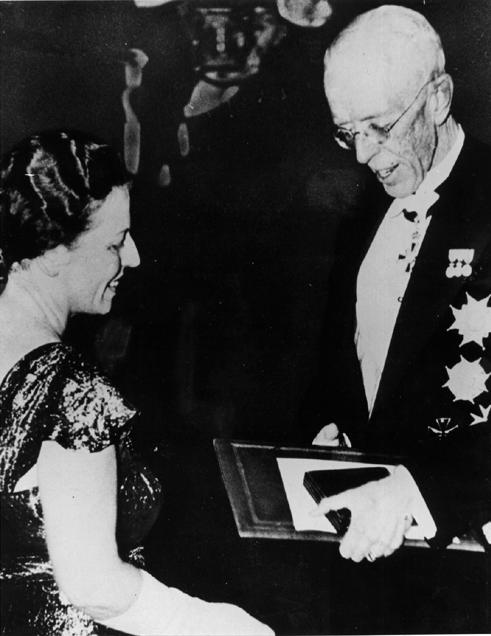Taste Is Personal: A Primer in Nobel Prize-Winning Literature
The subjective theory of value in action.

Three Nobel Prizes have already been announced this week, and Thomson Reuters, which has "accurately forecast 35 winners since 2002," failed to predict any of the new laureates. The well-respected firm "mines scientific research citations to identify the most influential researchers in the fields of chemistry, physics, medicine, and economics." Next week's announcement by the Royal Swedish Academy of Sciences of the prize in Economics offers a chance for Thomson Reuters to save face. But even so prominent a handicapper, with a significant financial stake in the accuracy of its forecasts, dares not predict the winners of the prizes in literature and peace, which have been awarded since 1901. Why?
The Nobel Prize in Literature has a deservedly sketchy reputation among journalists, professors of literature, and professional critics. For every Samuel Beckett, Alexandr Solzhenitsyn, and Gabriel García Márquez, whose Nobel triumph has thrilled book lovers and theater-goers, there is a Bjørnstjerne Bjørnson, Karl Adolph Gjellerup, and Frans Eemil Sillanpää, whose shocking literary deification has left readers puzzling over an unfamiliar name and wondering whether it's time to once again change the prescription of their reading glasses. No doubt the regional and linguistic biases of the Swedish Royal Academy committee that select the annual winner explain a parochial impatience among Anglophone readers with obscure Nordic winners, instant literary celebrities with far too many syllables and diacritical marks in their names to generate veneration for their as-yet un-translated works.
If it's Quixotic for Thomson Reuters to predict with confidence winners of the Nobel prizes in the sciences, dismal or otherwise, then it seems utterly mad for anyone who reads novels, poems, plays, and memoirs, even professionally, to forecast the winner of the Nobel Prize in literature. (Even predicting the winner of the Peace Prize seems by comparison a rational enterprise: simply identify a former or potential war-criminal, terrorist, or would-be authoritarian leader who has lately made nice with the world press). To be sure, we are sometimes pleasantly surprised by the Royal Swedish Academy press release. The stunning announcement last year that Mario Vargas Llosa had won the Nobel Prize for literature is a case in point. A Peruvian novelist possessed of precocious and extraordinary talents, Vargas Llosa was not considered a likely winner by journalists and literature professors. His controversial reputation as one of Latin America's leading champions of "neo-liberal" economic and political reform, his very public criticism of fundamentalist Islam, and his unstinting denunciation of the authoritarian government of Fidel Castro and his brother appeared to disqualify him as a serious candidate for the Nobel laureate.
And yet, is it so terrible that the committee members who select the winner of the Nobel Prize in Literature annually exercise such predictably fickle, even perverse judgment? After all, it's been some time since any serious mind publicly claimed that literary criticism was a science, much less a predictive one. Since the rise of "aesthetic philosophy" in late 18th-century and earl 19th-century Europe, formidable attempts have been made by the likes of Immanuel Kant, Friedrich Schiller, and G.W.F. Hegel, as well their Scottish and English counterparts—Adam Smith, Edmund Burke, and Samuel Taylor Coleridge—to articulate an objective theory of literary value and artistic taste. But their theories fell under the skeptical gaze of later philosophers such as Friedrich Nietzsche who dismissed the notion of scientifically and objectively verifiable literary value, indeed of all objective values. Rendered silent in 1889 by a debilitating stroke brought on by self-prescribed medicines to treat his stomach ailments, Nietzsche never saw the immense influence of his aesthetic and moral critique of objective ethical and aesthetic values. He never learned before his death in 1900 of the "marginal revolution" in economics begun in England, Austria, and Switzerland in the 1860s and 70s by William Stanley Jevons, Carl Menger, and Léon Walras. We can only speculate on what he might have thought of this epochal shift in our understanding of economics, a seismic event that the Austrian economist, Ludwig von Mises recast as a more general "subjective theory of value" in the early 20th-century.
Oddly enough, mainstream literary criticism (leaving aside the vexed matter of whether the reading of novels and poetry these days can in any way be called "mainstream") and at least one increasingly influential, but still immensely controversial strand of economic science, agree that our tastes are a matter of individual and constantly changing judgment. As F. A. Hayek, a co-winner in 1971 of the Nobel Prize in Economics pointed out, the power of a government to centrally plan an economy is fatally compromised by its inability to know, anticipate, and account for the innumerable personal tastes of hundreds of millions of people, whose ever-changing needs signal to producers what they provide if those desires are to be most efficiently met. The subjective and unpredictable character of literary taste, which is deeply personal and subject to sudden, rapid, and unpredictable changes in cultural fashions, regional prejudices, and individual caprice, is a conspicuous and exemplary instance of the subjective theory of value and the glorious marginal revolution. We have returned to an insight of the ancients, who did not presume to offer a universal and objective theory of taste, culinary, literary, or otherwise: De gusitbus non est disputandum. "In matters of taste there can be no disputing."
So who will be this year's Nobel laureate in literature? I have no idea. Maybe the data-freaks and computer-modelers at Thomson Reuters will hazard a prediction based on their much prized and highly advanced scientific methodologies and protocols. But it seems likely they won't, especially given their track record this week. Surely that's a good thing for literature, not to mention for the economic and political health of world culture.


Show Comments (36)